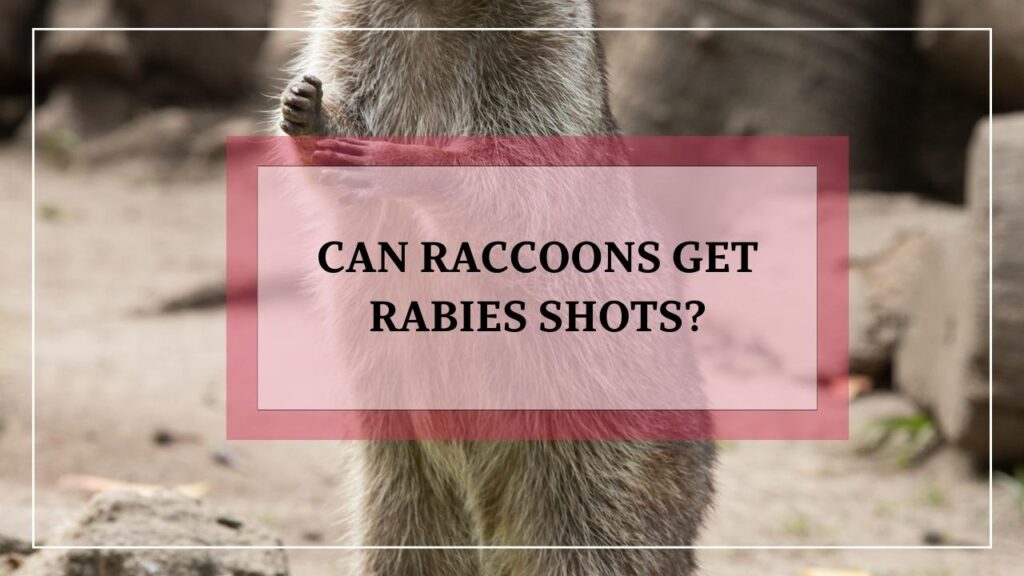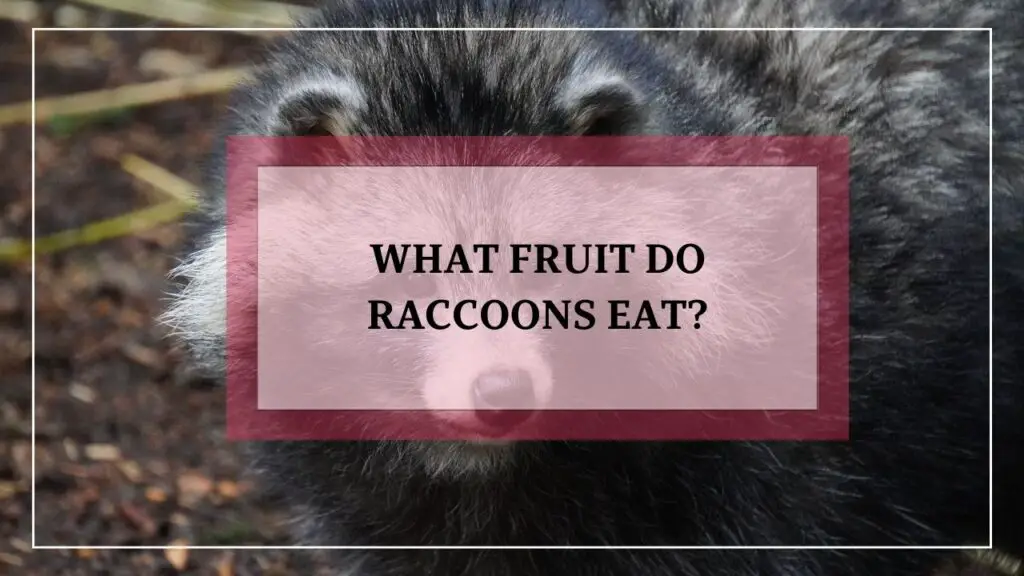Raccoons are fascinating creatures that live in forests and sometimes even in cities. They are known for their black masks and bushy tails. But have you ever wondered if raccoons can get rabies shots? Well, the answer is no, they can’t. You see, rabies is a disease that affects animals and humans, and it can be very dangerous. However, raccoons are wild animals, and they don’t go to the doctor to get shots like we do.
They rely on their natural immune system to fight off diseases. Sometimes, raccoons can get infected with rabies if they are bitten by another animal that has the disease. So, it’s important to stay away from raccoons and other wild animals to keep ourselves safe. Remember, it’s always best to admire raccoons from a distance and let them be wild in their natural habitats.
Understanding Rabies in Raccoons
Raccoons as potential carriers of rabies
Raccoons, those adorable little bandits of the night, can indeed be carriers of rabies. While not all raccoons have the virus, it’s important to be cautious when encountering them, especially if they’re acting strangely or aggressively. Raccoons can contract rabies from other infected animals, such as bats or other raccoons, so it’s crucial to stay vigilant.
Prevalence of rabies in raccoons
Rabies is a serious concern among raccoons, as they are one of the most commonly infected species in North America. In fact, according to the Centers for Disease Control and Prevention (CDC), raccoons account for the largest number of reported rabid animals in the United States. This is why it’s important to take precautions to protect yourself and your pets.
Symptoms of rabies in raccoons
Identifying a rabid raccoon can be tricky, but there are some telltale signs to watch out for. Raccoons infected with rabies may exhibit unusual behavior, such as aggression, disorientation, stumbling, excessive drooling, and even paralysis. If you come across a raccoon displaying any of these symptoms, it’s best to steer clear and contact local animal control authorities.
Related Article:Can Raccoons Die From Rabies?
Important note:
Remember, I’m not a wildlife expert, just a friendly writer trying to help you out. If you suspect a raccoon has rabies or if you have any concerns about rabies in your area, it’s always a good idea to consult with local authorities or wildlife professionals. They can provide you with the most accurate and up-to-date information on rabies prevention and control. Stay safe, my friend!
The importance of rabies vaccinations
Overview of rabies vaccination in preventing the disease
Rabies vaccinations are crucial in preventing the spread of this deadly disease. They work by stimulating the immune system to produce antibodies that can fight off the virus if exposed. This not only protects the vaccinated animal but also helps prevent the transmission of rabies to humans and other animals.
Vaccination requirements for domestic animals
In many countries, including the United States, rabies vaccinations are mandatory for domestic animals like dogs and cats. This is because they are more likely to come into contact with rabid animals, such as raccoons, and can potentially transmit the disease to humans. Vaccinating these pets helps create a barrier against the spread of rabies and ensures their safety.
Addressing the need for raccoon vaccinations
While raccoons are not typically considered domestic animals, their potential role as carriers of rabies makes it important to address the need for their vaccination. Unfortunately, vaccinating wild raccoons poses unique challenges due to legal restrictions and limitations on vaccinating wild animals.
Challenges in vaccinating raccoons
Legal restrictions and limitations on vaccinating wild animals make it difficult to administer rabies vaccines to raccoons. Additionally, capturing raccoons for vaccination purposes can be challenging due to their elusive nature and ability to climb trees and escape. These factors make it impractical to vaccinate raccoons on an individual basis.
Alternative methods for reducing rabies transmission in raccoon populations
While vaccinating raccoons may not be feasible, there are alternative methods for reducing rabies transmission in raccoon populations. These include oral rabies vaccination programs, where bait containing the vaccine is distributed in raccoon habitats. When raccoons consume the bait, they receive the vaccine, helping to create immunity within the population.
Protecting yourself and your pets from raccoon-related rabies
While vaccinations are essential, there are steps you can take to protect yourself and your pets from raccoon-related rabies. Implementing preventive measures, such as securing trash cans and pet food, can help minimize raccoon encounters. Understanding the risk factors associated with raccoon bites, such as nocturnal activity and aggressive behavior, can also help you stay vigilant.
Related Article:What Does Rabies Do To Raccoons?
Responding to potential raccoon exposure incidents
If you or your pet have been potentially exposed to a raccoon, it’s important to seek medical attention or veterinary care immediately. Even if the raccoon is not exhibiting symptoms of rabies, it’s better to be safe than sorry. Prompt medical intervention can prevent the disease from progressing and potentially save lives.
In conclusion, while vaccinating raccoons directly may not be feasible, it is crucial to prioritize rabies vaccinations for domestic animals and implement preventive measures to reduce raccoon encounters. By doing so, we can protect ourselves, our pets, and even raccoons from the devastating effects of rabies. Stay safe, and don’t let those adorable masked bandits fool you – they may be cute, but their potential for carrying rabies is no laughing matter!
Challenges in Vaccinating Raccoons
Legal restrictions and limitations on vaccinating wild animals
Vaccinating raccoons can be a bit tricky due to legal restrictions and limitations on administering vaccines to wild animals. Many countries and states have regulations in place that prohibit individuals from capturing and vaccinating wild animals without proper permits or licenses. These regulations are in place to ensure the safety and well-being of both humans and animals. So, as much as we’d like to help protect raccoons from rabies, it’s important to follow the laws and regulations in your area.
Difficulties in capturing and administering vaccines to raccoons
Even if you have the necessary permits to vaccinate raccoons, there are still practical challenges to consider. Raccoons are agile and resourceful creatures, making them difficult to catch. Unlike our furry companions at home who willingly come to us for treats and belly rubs, raccoons are more elusive and cautious. Trying to catch a raccoon for vaccination can turn into quite the adventure!
Additionally, administering vaccines to raccoons can be a bit more challenging compared to domestic animals. Raccoons aren’t exactly keen on rolling up their sleeves and holding still for a shot. So, unless you’re an experienced wildlife handler or veterinarian, it’s best to leave this task to the professionals who have the necessary skills and equipment for safely vaccinating raccoons.
Alternative methods for reducing rabies transmission in raccoon populations
While vaccinating raccoons directly may not be feasible for most individuals, there are other ways to help reduce rabies transmission in raccoon populations. One effective method is called oral rabies vaccination (ORV). ORV involves distributing bait containing a vaccine that can be consumed by raccoons and other wildlife. The vaccine is then absorbed by the animals, providing them with protection against rabies.
This method has been successfully used in many areas to control rabies in raccoons. It’s a more practical approach since it doesn’t require capturing and vaccinating each raccoon individually. Instead, the vaccines are distributed in bait stations located in areas with high raccoon populations. So, while we might not be able to give raccoons shots like we do with our pets, we can still contribute to their health and well-being by supporting initiatives that use alternative methods like ORV to control rabies transmission.
Related Article:Why Do Raccoons Carry Rabies
So, even though vaccinating raccoons directly may not be feasible for most of us, there are still ways we can help protect them and ourselves from rabies. By following preventive measures, understanding the risk factors, and supporting initiatives like ORV, we can contribute to a safer coexistence with these fascinating creatures.
Protecting yourself and your pets from raccoon-related rabies
Implementing preventive measures against raccoon encounters
Raccoons can be curious and resourceful creatures, so it’s important to take steps to minimize the chances of encountering them. Here are a few tips to help keep raccoons at bay:
1. Secure your garbage: Raccoons are notorious for rummaging through trash in search of food. Make sure your garbage cans have tight lids or consider using bungee cords to secure them. If possible, store garbage cans in a locked shed or garage.
2. Remove potential food sources: Raccoons are attracted to pet food, bird feeders, and fallen fruits or vegetables in your yard. Keep pet food indoors, use bird feeders that are raccoon-proof, and promptly clean up any fallen produce.
3. Seal off entry points: Raccoons can squeeze through small openings, so check your home for any potential entry points, such as loose vents or gaps under doors. Seal these off to prevent raccoons from getting inside.
Understanding the risk factors associated with raccoon bites
While raccoons may appear cute and harmless, it’s important to remember that they are wild animals. Raccoon bites can potentially transmit rabies, so it’s crucial to be cautious around them. Here are some risk factors to be aware of:
1. Avoid direct contact: Never attempt to touch or handle a raccoon, even if it appears friendly or injured. Raccoons can be unpredictable and may bite or scratch if they feel threatened.
2. Be cautious around sick or acting strange raccoons: Rabid raccoons may exhibit unusual behavior, such as aggressive tendencies, disorientation, or foaming at the mouth. If you encounter a raccoon displaying these symptoms, contact local animal control authorities immediately.
Related Article:Can Raccoons Get High?
Responding to potential raccoon exposure incidents
If you or your pet has had a potential exposure to a raccoon, it’s important to take prompt action. Here’s what you should do:
1. Seek medical attention: If you or a family member has been bitten or scratched by a raccoon, wash the wound thoroughly with soap and water and seek medical attention immediately. The healthcare provider will assess the risk of rabies transmission and may recommend post-exposure prophylaxis.
2. Consult a veterinarian: If your pet has been bitten or scratched by a raccoon, contact your veterinarian as soon as possible. They will assess the situation and determine if your pet needs a rabies booster or other preventive measures.
Remember, prevention is key when it comes to raccoon-related rabies. By implementing preventive measures and being cautious around raccoons, you can help protect yourself and your furry friends from this serious disease.
FAQs
Can raccoons get rabies shots?
Yes, raccoons can receive rabies shots. However, it is important to note that administering rabies shots to raccoons is typically done by trained professionals in wildlife management or animal control. It is not common for pet owners to provide rabies shots to raccoons as they are wild animals.
Why is it important to vaccinate raccoons against rabies?
Vaccinating raccoons against rabies is crucial to prevent the spread of the disease. Raccoons are one of the primary carriers of rabies in North America. By vaccinating raccoons, we can reduce the risk of transmission to other animals and humans, helping to protect public health and ensure the well-being of wildlife populations.
Are rabies shots mandatory for raccoons?
No, rabies shots are not mandatory for raccoons. However, it is strongly recommended to vaccinate raccoons against rabies to prevent the spread of the disease. Many municipalities and wildlife management agencies undertake vaccination programs to control rabies in raccoon populations, but it is not a legal requirement for raccoons to receive rabies shots.
Related Article:Can Raccoons Be Born With Rabies?
Conclusion
In conclusion, while raccoons can indeed contract rabies and potentially transmit the disease, it is challenging to administer rabies shots to wild raccoons. Rabies vaccinations are crucial in preventing the spread of this deadly virus, and they are required for domestic animals such as dogs and cats. However, due to legal restrictions and difficulties in capturing and vaccinating wild animals like raccoons, it is not currently feasible to give rabies shots to this species.
To protect yourself and your pets from raccoon-related rabies, it is important to implement preventive measures such as securing trash cans, sealing off potential entry points to your home, and avoiding direct contact with raccoons. Understanding the risk factors associated with raccoon bites and responding appropriately to potential raccoon exposure incidents can also help prevent the spread of rabies.
Overall, rabies awareness and prevention are of utmost importance. By staying informed and taking necessary precautions, we can help reduce the risk of rabies transmission and ensure the safety of ourselves, our pets, and our communities.

Hi, I’m Ali Tarek, the founder of Animalsman. I’ve always been passionate about pets, especially dogs and cats, and I created this website to share practical tips, easy recipes, and helpful care advice for fellow pet lovers. My goal is to make pet care simple, enjoyable, and accessible for everyone. When I’m not writing or curating content, you’ll usually find me spending time with my furry friends or learning new ways to keep them happy and healthy.



